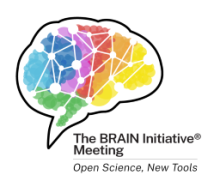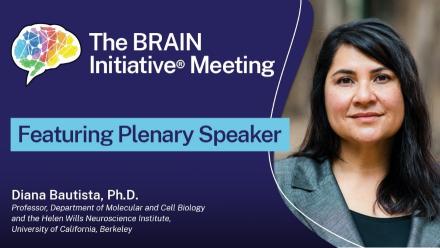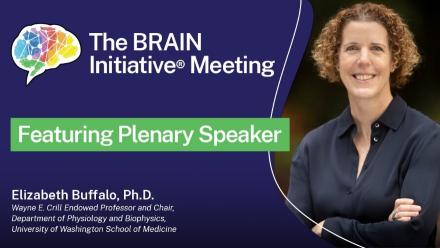
Please join us virtually on June 21-22 at the BRAIN Initiative’s 8th Annual Meeting and hear from our three plenary speakers as they share their expertise and insights with the BRAIN research community.
The 8th Annual BRAIN Initiative Meeting: Open Science, New Tools is quickly approaching—and it’s not too late to register for the virtual event! An all-virtual attendance provides you with the full digital access to exhibits and posters, networking opportunities, keynote and symposia presentations and discussions, and more. We are very excited to welcome three talented and highly accomplished plenary speakers, each of them described with details about their sessions below. All session times are listed in Eastern Daylight Time (EDT).
Diana Bautista, Ph.D.

-
Bio: Dr. Bautista is a professor in the Department of Molecular and Cell Biology and the Helen Wills Neuroscience Institute at the University of California, Berkeley. Her lab studies how neurons, immune cells, and epithelial cells detect itch, pain, and tactile stimuli. Dr. Bautista’s current projects include developing cellular assays to analyze somatosensory neurons, developing in vivo assays to analyze molecules associated with light touch, investigating molecules associated with touch in the star-nosed mole, and investigating the molecular mechanisms associated with itch.
-
Session Title: Peripheral Neuroimmune Interactions Drive Itch and Inflammation
-
Session Date and Time: Tuesday, June 21 at 9:15 AM EDT
-
Session Description: Atopic dermatitis is a chronic itch disorder that affects approximately 15% of children worldwide, half of whom go on to develop food allergies, allergic rhinitis, and asthma. Abnormal activity in epithelial cells, neurons, and immune cells is a hallmark of this so-called atopic march. This talk highlights recent efforts to decipher the neuroimmune interactions that drive neuronal hyperexcitability development, itch, and airway inflammation in atopic disease.
Elizabeth Buffalo, Ph.D.

-
Bio: Dr. Buffalo is a Wayne E. Crill endowed professor and chair in the Department of Physiology and Biophysics at the University of Washington School of Medicine. Her lab studies the neural mechanisms behind learning and memory with three focus areas: neural signals for memory in the human brain; eye movements and memory; and aging and memory. Dr. Buffalo’s BRAIN award studies interactions between the hippocampus and the surrounding cortical regions using large-scale recording techniques.
-
Session Title: Neural Dynamics of Memory Formation in the Primate Hippocampus
-
Session Date and Time: Tuesday, June 21 at 4:00 PM EDT
-
Session Description: Hippocampal neurons have been most often studied in rodents running mazes, resulting in a rich history characterizing their activity as spatial correlates. These neurons also respond to a variety of tasks without an explicit spatial component, suggesting that hippocampal activity patterns more generally reflect the progression of experience through salient task events. This talk presents findings from large-scale recordings throughout the hippocampus in monkeys performing memory tasks in multiple environments in virtual reality.
Kafui Dzirasa, M.D., Ph.D.

-
Bio: Dr. Dzirasa is a K. Ranga Rama Krishnan associate professor in the Department of Psychiatry and Behavioral Sciences at Duke University Medical Center. Dr. Dzirasa’s lab studies how changes in the brain produce neurological and mental illness, specifically, how neuropsychiatric risk genes interact with stress to modify neural circuits. His BRAIN award is being used to develop a new biological technology platform that can project neural activity onto a 2D flat surface outside of the brain to record and monitor neural activity to overcome geometric challenges in the brain.
-
Session Title: Rewiring Neural Circuits in Health and Disease
-
Session Date and Time: Wednesday, June 22 at 9:15 AM EDT
-
Session Description: The coordination of activity between brain cells is a key determinant of neural circuit function. Nevertheless, approaches that selectively regulate communication between two distinct cellular components of a circuit while leaving the activity of the presynaptic brain cell undisturbed remain sparse. This talk addresses this gap and how Dr. Dzirasa’s team developed a novel class of electrical synapses, validated them in vivo using C. elegans, and deployed them in mice to modify emotional behavior.
Register today! If you have any questions, you can reach out to the meeting organizers at BrainInitiativeConferences@mail.nih.gov. This is a public event, so please feel free to share the news with your networks.
We look forward to your participation next week!
